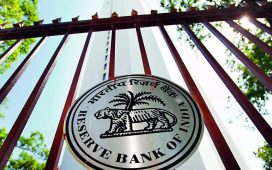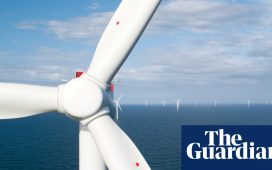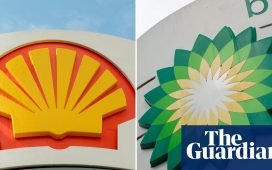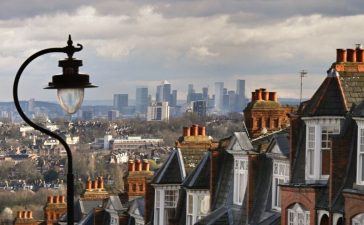After a summer of ever-more deadly floods, droughts and firestorms, two autumn summits – the G20 and the UN general assembly – have come and gone. Both failed to deliver the long-promised global plan to finance climate mitigation and adaptation. But as political leaders issue toothless and easily forgettable communiques, a potential breakthrough is staring the world in the face. It could finally end the cycle of broken promises to the global south and rescue the next summit, Cop28 in November and December.
Last year, the oil and gas industry across the world banked about $4tn, according to the head of the International Energy Agency. This represents one of the biggest redistributions of wealth from the world’s poor to the richest petrostates. The record energy prices that have produced these unearned gains have not only caused dramatically rising poverty and debt in the global south, but have also stymied decades of progress in extending power into homes, villages and towns that were previously without electricity.
Let’s put this in perspective: $4tn is a bigger sum than the entire UK economy and about 20 times all the international aid budgets of the world. It is 40 times the $100bn-a-year target for the global south that was pledged in 2009 for 2020 but never reached.
The windfall has given energy exporters, including the Gulf states and Norway, nearly $1tn of earnings from their foreign sales alone, and the failure to recycle a fraction of these gains to the world’s poorest countries is one of the great scandals of our times.
It is this lottery-style bonanza, amassed by petrostates, that is the backdrop to the Cop28 climate summit in the United Arab Emirates. The summit will be chaired by Sultan Al Jaber, the head of the Abu Dhabi National Oil Company, which is one of the biggest beneficiaries of the windfall.
He has called on the wealthiest countries to “show me the money” to meet “long overdue” financing pledges. But with the conference on a pathway to failure due to a lack of finance, it is Al Jaber’s country that now has the responsibility and opportunity to be the first mover in delivering to the global south.
A $25bn global windfall levy on oil and gas profits, paid by the richest petrostates, would amount to less than 1% of global oil and gas revenues and only 3% of the export earnings of these major producers. Each of the richest petrostates can easily afford to pay. The UAE has seen its export earnings rise from $76bn to $119bn; it can afford to contribute $3bn without any impact on the energy prices paid by its domestic consumers. And it is not alone: with Qatar’s export earnings, mainly from gas, rising from $53bn to $86bn it too could easily afford $3bn, as could Kuwait with its export earnings increasing from $63bn to $98bn.
Norway has benefited even more, its export earnings dramatically rising to around $174bn ; it can afford a $5.2bn levy. But the biggest contributor of all must be Saudi Arabia, which has amassed a windfall gain of $120bn as export earnings have risen to $311bn. The $10.35bn it should be asked to contribute is less than what it is spending on buying up football, boxing and golf.
The $25bn global windfall levy could also be the trigger for historical and current emitters to contribute their share of the $1tn a year now required to meet the climate and development needs of the global south.
Countries with triple AAA or double AA+ credit ratings can offer guarantees to multilateral development banks which, on the strength of those guarantees, can borrow on attractive terms from the financial markets. If some of the global windfall levy is used as collateral, Europe and North America could provide $25bn in guarantees which can be leveraged by the multilateral institutions four times over – thus creating $100bn of resources that could fund the exit from coal and expand solar and other renewables in sub-Saharan Africa. An even more ambitious offer – $100bn of guarantees – could create $400bn in fresh investment so that Africa can receive more than the meagre 3% of climate finance on offer.
Once we add the money released by the ambitious Bridgetown Agenda (devised by the prime minister of Barbados, Mia Mottley) and the Summers-Singh plan (which would radically refinance the multilateral development banks), the total funding for development kickstarted by the global windfall levy could reach $1tn.
And with oil and gas profits remaining high not as an accident but because of a deliberate Opec Organisation decision to continue to restrict production, there is no reason why the levy should not be paid on an annual basis.
Next year is the 80th anniversary of the 1944 Bretton Woods agreement, when a new international financial architecture was put in place to manage the global economic system. With the notable exception of paying for UN peacekeeping, no one then or since has ever agreed how the costs of funding global public goods would be shared.
As a result, 14 years have gone by without the west delivering the $100bn per year promised for mitigation and adaptation, or the Loss and Damage fund agreed a year ago. There are now doubts as to whether a separate $100bn of international money, known as special drawing rights, will ever fully materialise. Initiatives that pass the begging bowl round in a time of crisis are no substitute for an equitable system of burden-sharing, based on historical and current emissions and countries’ capacity to pay.
And so, if future summits are to enjoy any credibility in the global south, the deadlock on finance has to be broken. A breakthrough at Cop28 will elude us without intense public pressure on the host country to produce a plan. To speed that up, Brazil’s President Lula, the new chair of the G20, is the right person to convene a joint G20-Opec summit to push change through. At last, we would be offering crisis-torn countries the thing that has been absent this summer and missing from the conclusions of recent summits: hope. The money is there – world leaders must have the courage to call on it. Now.
-
Gordon Brown was UK prime minister from 2007 to 2010. His new book, Permacrisis: A Plan to Fix a Fractured World, co-authored with Mohammed el-Erian and Michael Spence, is out on 28 September.
-
Gordon Brown joins the Guardian live and online on Tuesday 26 September, 7pm–8.30pm BST. Buy tickets here











